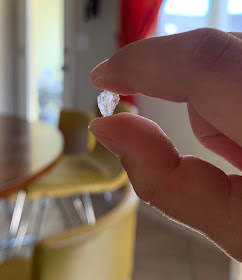 |
| click to enlarge |
It was kind of fun to have our section on "Bones" correspond with the week of Halloween—we made this cool life-sized skeleton out of milk cartons, and it made a perfect Halloween decoration for our porch! :)
Our milk-carton skeleton was a friend for this skeleton we already had!
More Bones activities:
A life-size skeleton print-out (we printed several of these and the children colored them)A video about the skeletal system
A diagram of major bones, for labeling
A little online skeletal system game
For muscles,
we learned how muscles worked and made models of extensors and flexors.We learned about some famous martial artists.
We watched some amazing gymnastic routines (here are some examples),
The kids LOVED seeing some of Damien Walters' work—he is a stuntman who does amazing tricks!
And we watched some Buster Keaton movies to learn about physical comedy in movies.
For the heart and lungs,
We made these lung models again,
We talked about deep-sea divers and this amazing man, Stig Severinsen
We learned about several Olympic athletes such as Michael Phelps, Usain Bolt, Eliud Kipchoge, and Rowan Hooper, an ultramarathon runner.
We learned about anaerobic vs. aerobic respiration, oxygen exchange, and altitude sickness.
Here are some more activities about the heart and lungs.
For sight and hearing,
We learned about blind people who "see" using sonar or clicking sounds (see also here)
We watched a video about this archer with incredible eyesight (and reflexes!)
We learned about Stephen Wiltshire, a man with Savant Syndrome, who can remember and draw whole city skylines
And Derek Paravinci, who has an incredible ability for playing music by earWe also watched some videos about samurais, marksmen, and archers, all of whom have developed their eyesight and reflexes in pursuit of excellence in their sports.
For memory,
We learned more about short-term memory, long-term memory, mnemonics, and Savant Syndrome.We watched a movie about Kim Peek, about whom the movie "Rain Man" was made. I haven't seen Rain Man, but we loved learning about Kim. We learned that he was a member of our church, The Church of Jesus Christ of Latter-day Saints, and he loved the Book of Mormon!
We also learned about Daniel Tammet, who has a prodigious memory.
We also learned about Babies--
We did some activities we've enjoyed before (like swaddling, learning to change diapers, etc.), we read some of our favorite books, and the children even got to help do an ultrasound on me in preparation for the new baby!






















































































